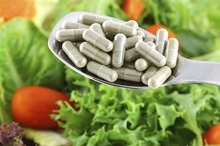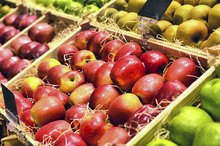High Fiber Pills to Suppress Appetite
There are many weight loss pills and plans that claim to suppress your appetite to help you reach your goals. Many of these products do not live up to the claims they make, but if you are looking for help controlling your appetite, try adding some fiber to your diet. Fiber can help to curb hunger and getting enough is an important component of a weight loss and weight management plan. If your diet is inadequate you may considering fiber pills. However, talk to your doctor first, because fiber pills may cause unwanted side effects.
Fiber and Hunger
Fiber is the part of food that your body cannot digest and it has little nutritional value. The two kinds of fiber are soluble, which dissolves in water and insoluble, which does not, and your body needs both. Getting enough fiber can aid weight loss efforts, because foods high in fiber usually require more chewing time, which gives your body time to register when you are no longer hungry; it makes you feel full for a longer period, and high-fiber diets tend to include lower calorie foods, reports the National Obesity Foundation. Men age 50 and younger need about 38 grams of fiber each day, while women of that age require 25 grams. Men older than 50 should get 30 grams and older women need 21 grams. Food is the best way to meet your fiber needs which can be accomplished by eating a wide variety of whole grain products, fruits, vegetables, beans, peas and other legumes as well as nuts and seeds.
Fiber Supplements
Prune Juice vs. Fiber Supplement
Learn More
Soluble fiber such as psyllium, pectin, and guar gum seems to be the best when it comes to suppressing appetite, and this type of fiber is found in dried beans, peas, oats, barley, fruits and psyllium seed husks. Soluble fiber can also be found in supplement form, and the goal is to get as much fiber as you can through diet, and then use supplements to make up the difference. It is always best to talk to your doctor before taking fiber supplements, because they can cause side effects and interact with other herbal, over-the-counter and prescription medications you may be taking, notes the University of Maryland Medical Center.
Side Effects
Unlike food, fiber supplements have very little nutritional value outside of the fiber. By contrast, eating a variety of fruits, vegetables and whole grains provides you with fiber and many nutrients your body needs. In addition, taking supplements may lead to consuming too much fiber all at once, and a high level of fiber can lead to the fiber binding with some minerals making them less available to your body, according to the University of California. In contrast, eating high fiber foods replaces lost minerals. In addition, when first adding fiber to your diet, you may experience cramping, diarrhea, and intestinal gas. The risk of symptoms from too much fiber is greater with pills than food.
Food Sources
Side Effects of Pectin
Learn More
To help cut down on side effects from food or supplements, FamilyDoctor.org suggests drinking eight glasses of no- or low-calorie beverages, such as water, unsweetened tea or diet soda each day. It is also best to spread out your fiber intake throughout the day. To meet your fiber needs, aim to get 2 cups of fruit and 2 ½ cups of vegetables every day and you should try to eat beans on a regular basis. Go for whole grain foods over refined and processed grains and look for products that supply 5 grams of fiber or more per serving. Since fiber content in pills can vary greatly, make sure to read the nutrition label carefully to know exactly how much you are getting.
Related Articles
References
Writer Bio
I hold a Master's degree in exercise physiology/health promotion. I am a certified fitness specialist through the American College of Spots Medicine and an IYT certified yoga teacher. I have over 25 years experience teaching classes to both general public and those with chronic illness. The above allows me to write directly to the reader based on personal experiences.









